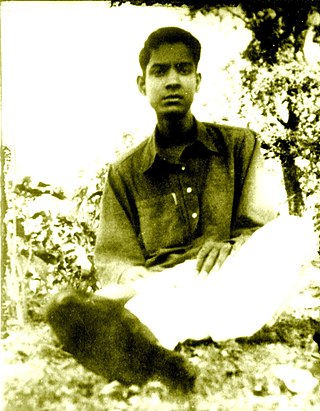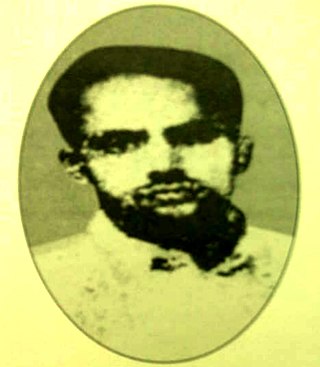
Language Movement Day, also called State Language Day or Language Martyrs' Day, is a national holiday of Bangladesh taking place on 21 February each year and commemorating the Bengali language movement and its martyrs. On this day, people visit Shaheed Minar to pay homage to the movement's martyrs and arrange seminars discussing and promoting Bengali as the state language of Bangladesh.

The Bengali language movement was a political movement in former East Bengal advocating the recognition of the Bengali language as an official language of the then-Dominion of Pakistan to allow its use in government affairs, the continuation of its use as a medium of education, its use in media, currency and stamps, and to maintain its writing in the Bengali script.

Dhaka Medical College and Hospital is a public medical college and hospital located in Dhaka, the capital city of Bangladesh. It houses medical school as well as a tertiary care hospital on one campus.

The Shaheed Minar is a national monument in Dhaka, Bangladesh, established to commemorate those killed during the Bengali Language Movement demonstrations of 1952 in then East Pakistan.
Shaheed Minar may refer to:

Shawkat Ali was a politician and a leader of the Bengali Language Movement. He was one of the founders of Awami Muslim League - which later became Awami League and is now the Bangladesh Awami League. He was a member of all three Rastrabhasa Sangram Parishad. He was also the Chief Organizer of Dhaka City Awami League during the 1950s. His house in 150, Chawk Moghultuly, Dhaka was the center for many activities and meetings during the Language Movement. He died of a stroke on August 18, 1975. He is buried in Jurain graveyard in Dhaka.

Abul Barkat was a protester killed during the Bengali Language Movement protests which took place in the erstwhile East Pakistan, in 1952. He is considered a martyr in Bangladesh.

Rafiq Uddin Ahmed was a protester killed during the Bengali Language Movement that took place in East Pakistan in 1952. He is considered a martyr in Bangladesh.

Shafiur Rahman is considered in Bangladesh to be a martyr of the language movement which took place in the former East Pakistan.

Abdus Salam was a demonstrator who died during the Bengali Language Movement demonstrations which took place in the erstwhile East Bengal, Pakistan in 1952. He is considered a martyr in Bangladesh.

Abdul Jabbar was a protester who was killed during the Bengali language movement in 1952 that took place in the erstwhile East Pakistan. He is considered a martyr in Bangladesh.

"Ekusher Gaan", more popularly known as "Amar Bhaier Rokte Rangano" is a Bengali song written by Abdul Gaffar Choudhury to mark the Bengali Language Movement in 1952 East Pakistan. It was first published anonymously in the last page of a newspaper with the headline Ekusher Gaan, but was later published in Ekushey's February edition.

Hamidur Rahman was a Bangladeshi artist and sculptor. He is best known as the architect of the Shaheed Minar, a national monument in Dhaka, Bangladesh, established to commemorate the martyrs of the Language Movement of 1952.

Amanullah Mohammad Asaduzzaman was a student activist whose death at the hands of police during a protest on 20 January 1969 "changed the nature of the student-mass movement and ... turned into a mass-upsurge against the Ayub regime and its repressive measures", according to Banglapedia. The Daily Star reports him as one of three martyrs of the 1969 uprising in East Pakistan which "set the stage for the liberation war". He was awarded the Independence Day Award in 2018 posthumously by the Government of Bangladesh.
Pearu Sardar (1893–1961) was an area leader of Dhaka, Pakistan. At the beginning of the 20th century, the area leader of Dhaka was known as Sardar; he was known for his involvement in the Language Movement of 1952. The first Shaheed Minar to commemorate the Language Martyrs of February 21, 1952 was built immediately after the events of that day, with his sponsorship.
Sayed Haider was a Bangladeshi physician and Language Movement activist. He along with Badrul Alam designed the first Shaheed Minar. It was then demolished by the Pakistani Army on 26 February 1952. For his contribution to the Language Movement he was awarded Ekushey Padak in 2016.
Najiruddin Jehad was an activist of the pro-democracy movement of Bangladesh that led to the 1990 Mass Uprising in Bangladesh. Jehad, the first casualty of the 1990 Mass Uprising in Bangladesh was killed on 10 October due to the police excesses during the first nationwide strike of the full-fledged movement against Ershad, in front of Dainik Bangla intersection of capital Dhaka.
Halima Khatun was a Bangladeshi activist, writer and academic. She took part in Bengali Language Movement in 1952 along with other activists including Rawshan Ara Bachchu. She was the recipient of Bangla Academy Literary Award in 1981 and Ekushey Padak posthumously in 2019.
Monzur Hossain (1928–1968) was a Bangladeshi language activist and physician. He was conferred with Ekushey Padak posthumously in 2002 for his contribution to the Language Movement.
Golam Moula (1920-1967) was a Pakistani medical doctor, politician and political organizer. He was elected a member of the East Pakistan Legislative Assembly in the by-elections of 1956 and a member of the National Assembly of Pakistan in 1962. At that time he was the whip of the opposition in the Pakistan National Assembly.











